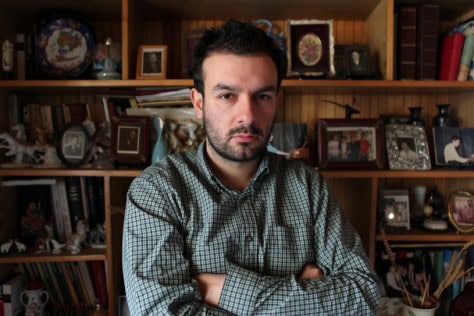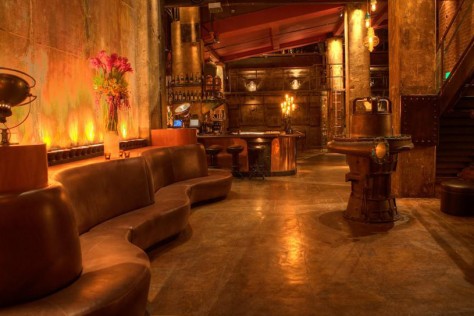Cinema is no stranger to the Holocaust; artists have been imagining, investigating, and occasionally exploiting this historical tragedy for decades. Yet Heartbeat Detector, a new film starring French sensation Mathieu Amalric (Diving Bell & The Butterfly, Kings and Queen) approaches its subject matter from a quite unique angle, focusing on the lingering guilt of European corporations who benefited from or actively participated in the Final Solution. Amalric plays an in-house psychologist for the fictitious SC Farb, a firm that is still reeling from a round of devastating lay-offs that he was instrumental in implementing. The film compares the dead, dishonest language of corporate life with the similarly debased language of the Nazis—both devalue human life, and both couch their violence in a seemingly innocent vocabulary. (While some have argued otherwise, director Nicolas Klotz isn’t equating Nazi crimes with corporate downsizing; like so many things, it’s a matter of semantics). Heartbeat Detector is a gruelingly intense masterpiece that fluctuates between the business world and the after-hours lives of overworked employees, with the stuffed-shirt life of the office giving way to sex-drenched raves and a succession of brilliantly choreographed party scenes.
Amalric—who we personally think is the most tragically hip character actor to grace the screen since Terence Stamp in the late 60s—is currently down in Panama, where he’s filming the next installment of the James Bond franchise. (He’ll play the villain Dominic Greene in Quantum of Solace, out in November). We called him up to talk about Heartbeat Detector—currently in US theaters—as well as suicide in France, burlesque dancers, and the violence that language often hides.
I don’t know if you’ve had a corporate office job in France, but would you say that SC Farb is typical of a French corporation?
Nicolas [Klotz, the director] didn’t ask me to go spend six months in a real company to know exactly how it really worked. I wanted to do that but he said ‘No, this is not what I’m looking for’. And as you can notice in the film it’s really fiction because sometimes you don’t know really [know] in what time you are. Some location[s] look like the 60s, sometimes you feel that you are [in modern times]. It’s not naturalistic, it’s not a documentary. Even the way we speak is very, very ‘written’ and all that.
[In a company] it’s always dangerous to say what you really think. You have to disguise, and you have to smile or shut up. That’s the best way to be powerful in France sometimes. We’re not asking people to be human sometimes. There’s a big company in France [where] there has been six suicides in two years and they are asking themselves ‘Why? What’s happening?’ There’s a lot of suicides in companies in France.
It’s funny because coming from the States we tend to look at France as a much more ideal place for workers. You have all this vacation, the state provides for you…so it’s interesting to hear you say this.
With the right wing now even stronger, unions don’t have that much power and solidarity. It’s very difficult. They just fired 20,000 teachers for next year. I don’t know what the thing is about France. We feel things really are tough, very tough.
You might be becoming more like us Americans, maybe.
Yes, but we don’t have the same story. We don’t have your energy. We don’t have your belief. We don’t have this thing about hope. We don’t have any hope, I think.
France doesn’t have any hope?
In France people hope that things won’t change! The story of America is completely different; it’s something completely different. The racism in France, it’s so different. I think the thing is really how people use words. In France we use a lot of American [business] words that seem modern—like managing. In fact, under those words there are violent acts.
What drew you to Heartbeat Detector? It’s a film that deals with the Holocaust, but in a very indirect way.
We spent almost four or five years before making the film to find the money and all that. Usually I’m more attracted by people than by paper, let’s say, so it’s really Nicolas Klotz, the meeting with him and the films that he has already done that I had seen and how he works. We never spoke about the Holocaust or things like that. When you say ‘indirectly,’ it was more I think about the use of words. The language—the technical, professional language, the way to manage to erase the violence of society. You just have a job, nobody has any responsibility anymore. You’re just a soldier, You’re just a good soldier—you obey. We’ve talked more I think about today than the resonance [of the Holocaust]. [Simon’s] not a monster; just a guy that had a job.
If you look at the film you realize that he almost never speaks, he’s just listening. He’s almost like a confessor or a denouncer. His job is to make people speak, like a priest sometimes. I was thinking of Montgomery Clift in the Hitchcock film where he has a secret and he’s not allowed to say it. That’s a strange position.
Language is very important in this film. I mean—I’m watching CNN. There is a language at CNN, you see what I mean? Now let’s say that when people have the power, in France mostly, they disguise their action. For example, immigration in France. We have a ministry called Ministry of Immigration and Integration and French Nationality, something like that. But of course they created that ministry just to kick more people out of the country. But they’re going to call it ‘integration.’ And then they say ‘No, it’s to help those people’. They’re never going to say ‘We have to kick 25,000 people out of the country,’ they just say ‘we didn’t achieve our numbers or plan’. It’s this way of talking that minimize[s] the violence.
The 'final solution' is a great word. The guy that invented that is amazing—the cynicism is amazing. You can find cynicism in some words today. But you should more speak with Nikolas than me; I just tried to be believable as a man who works in what we call [the] human resources department. You call it that, no? ‘Human resources,’ it’s quite funny. It’s more how to have good machines, good robots, and we call it human resources.
Nikolas would [never] dare say it is the same thing than what happened during the Second World War, of course not. It’s this sort of feeling that maybe something in society and the dreams that this society has today is killing human feelings.
Generally, what would you say makes a French film a ‘French’ film in its classic sense?
Well that I can’t know. And it’s a question that I often ask myself. What is American? One of my favorite periods of history in cinema is American films of the 70s. I think something really amazing happened in America in the 70s in movies. But when you read interviews of Scorsese, De Palma—they all say they couldn’t have done those films if they hadn’t seen European films. So it’s like if in the 70s in America there’s a great mixture of what is great in American cinema and what is maybe great in European cinema.
I know you’ve said before that you never intended to become an actor and that you were originally a director. I was curious to hear a bit about what you’ve done in that regard and what you have planned if anything in a director’s role.
Yes, in fact, I had refused all [acting] stuff to do my own film. I was supposed to shoot my film in March, but when this James Bond thing just fell on me it was an accident. You can’t refuse to be a villain in a James Bond film, it’s too funny. So I’m going to direct my film I think in November.
Can you say anything about the vision?
Well it’s funny because it’s very simple: a producer of television in France, who disappeared for five or six years, comes back [to] France for a tour of the ports, five, six days, with American women from the new burlesque shows. And it’s just six days with those American women touring and doing their strip shows in France. [It’s about] how we fantasize America and how America fantasizes France, in fact. That’s basically the story. It starts in north of France, near Calais, and it goes Brest, La Rochelle, and it’s finished at Toulon, near Marseille. And they don’t miss Paris too, those girls, of course they went into Paris.
Do you have any experience with American burlesque dancers?
Well now I do, I know them quite well now. I saw some shows in San Francisco. They won’t be actors; it will be really those women.
So it sounds like sort of a mix between documentary and fiction.
Well, no, for this film I really wrote the script. I wanted it to have a story. I think it will be a mixture, but it won’t be a documentary. : It’s the real women that will come in France, and anything can happen. I want to shoot night and day, any time. I can start to improvise—it’s like jazz. The stronger the melody, the more you can seek out that.
 Q&A with Larry Gus
Q&A with Larry Gus We Own the Night: The Edison
We Own the Night: The Edison
No Comments